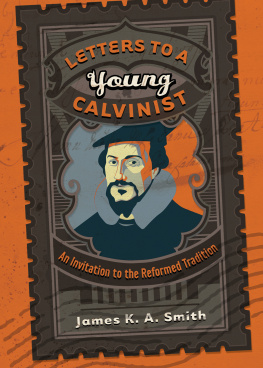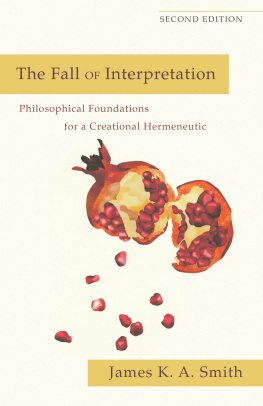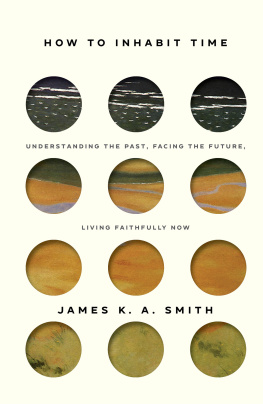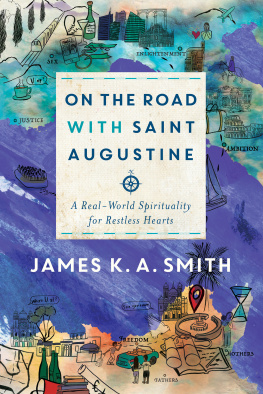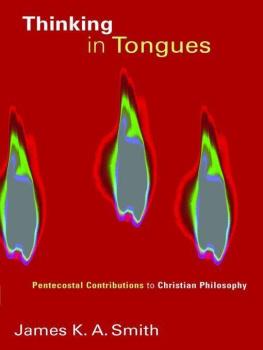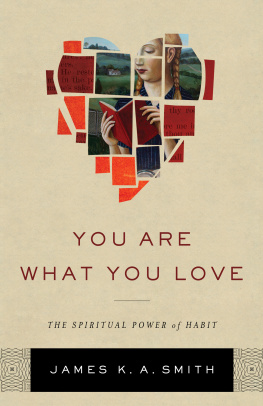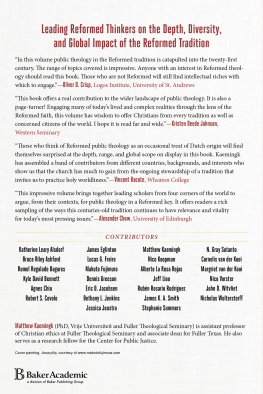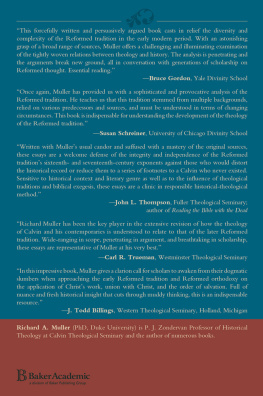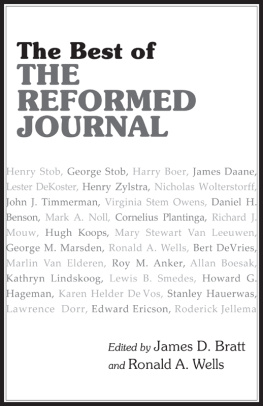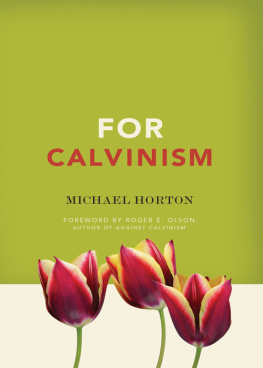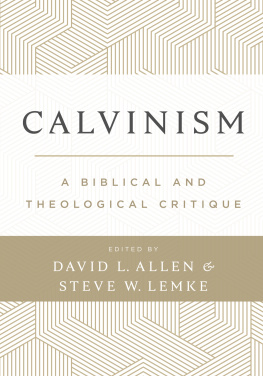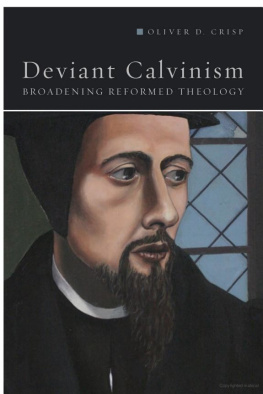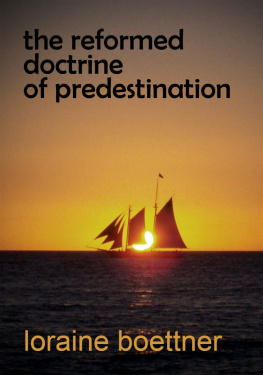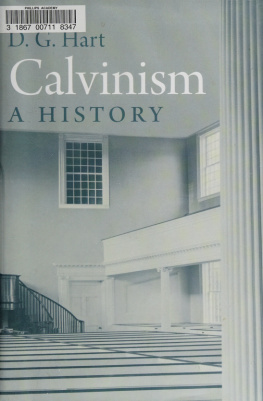James K. A. Smith - Letters to a Young Calvinist: An Invitation to the Reformed Tradition
Here you can read online James K. A. Smith - Letters to a Young Calvinist: An Invitation to the Reformed Tradition full text of the book (entire story) in english for free. Download pdf and epub, get meaning, cover and reviews about this ebook. year: 2010, publisher: Baker Publishing Group, genre: Religion. Description of the work, (preface) as well as reviews are available. Best literature library LitArk.com created for fans of good reading and offers a wide selection of genres:
Romance novel
Science fiction
Adventure
Detective
Science
History
Home and family
Prose
Art
Politics
Computer
Non-fiction
Religion
Business
Children
Humor
Choose a favorite category and find really read worthwhile books. Enjoy immersion in the world of imagination, feel the emotions of the characters or learn something new for yourself, make an fascinating discovery.
- Book:Letters to a Young Calvinist: An Invitation to the Reformed Tradition
- Author:
- Publisher:Baker Publishing Group
- Genre:
- Year:2010
- Rating:5 / 5
- Favourites:Add to favourites
- Your mark:
- 100
- 1
- 2
- 3
- 4
- 5
Letters to a Young Calvinist: An Invitation to the Reformed Tradition: summary, description and annotation
We offer to read an annotation, description, summary or preface (depends on what the author of the book "Letters to a Young Calvinist: An Invitation to the Reformed Tradition" wrote himself). If you haven't found the necessary information about the book — write in the comments, we will try to find it.
Letters to a Young Calvinist: An Invitation to the Reformed Tradition — read online for free the complete book (whole text) full work
Below is the text of the book, divided by pages. System saving the place of the last page read, allows you to conveniently read the book "Letters to a Young Calvinist: An Invitation to the Reformed Tradition" online for free, without having to search again every time where you left off. Put a bookmark, and you can go to the page where you finished reading at any time.
Font size:
Interval:
Bookmark:
2010 by James K. A. Smith
Published by Brazos Press
a division of Baker Publishing Group
P.O. Box 6287, Grand Rapids, MI 49516-6287
www.brazospress.com
Ebook edition created 2010
Ebook corrections 03.26.2018
All rights reserved. No part of this publication may be reproduced, stored in a retrieval system, or transmitted in any form or by any meansfor example, electronic, photocopy, recordingwithout the prior written permission of the publisher. The only exception is brief quotations in printed reviews.
Library of Congress Cataloging-in-Publication Data is on file at the Library of Congress, Washington, DC.
ISBN 978-1-4412-1373-0
Scripture quotations labeled NIV are from the Holy Bible, New International Version. NIV. Copyright 1973, 1978, 1984 by Biblica, Inc. Used by permission of Zondervan. All rights reserved worldwide. www.zondervan.com
Scripture quotations from The Message by Eugene H. Peterson are copyright 1993, 1994, 1995, 2000, 2001, 2002. Used by permission of NavPress Publishing Group. All rights reserved.
Scripture quotations identified NASB are from the New American Standard Bible, copyright 1960, 1962, 1963, 1968, 1971, 1972, 1973, 1975, 1977, 1995 by The Lockman Foundation. Used by permission. www.lockman.org
For
David, Frank, Myra, Sherryl, Carlos, Cheryl, and Danny
This I pray, that your love might increase more and more in knowledge and true discernment, so that you might discover the things that really matter, in order to be pure and blameless until the day of Christ.
Philippians 1:910 (authors translation)
Who would have guessed that in our postmodern culture something as austere as Calvinism would be both hip and hot? Quite apart from the five-hundredth anniversary of John Calvins birth in 2009, over the past several years what has been described as the new Calvinism has generated increasing interest and devotees chronicled most fully in Collin Hansens journalistic account, Young, Restless, Reformed: A Journalists Journey withthe New Calvinists. Associated with noted pastors such as John Piper and Mark Driscollas well as scholars such as Al Mohler and D. A. Carsonattention to the new Calvinism reached a crescendo when Time magazine, in an admittedly curious claim, designated it as one of the Ten Ideas Changing the World Right Now (March 12, 2009).
I experienced some of this newfound interest in Calvinism in an unlikely place: an Assemblies of God church in inner-city Los Angeles. While my wife and I served as directors of the college and career ministry at Del Aire Assembly of God in Hawthorne, California (which is a long way from Bel Air, just to clarify!), I witnessed an increasing hunger for rigorous theological reflection amongst the (mostly Latino/a) twenty-somethings in our group. Looking to develop Christian minds with theological depth, and casting about for an intellectual tradition they couldnt find in their Pentecostal heritage, these young people, not surprisingly, were attracted to the riches of the Reformed tradition. Anecdotally, this seems to be a common trajectory for many evangelicals.
Indeed, this is my own story. I was converted and formed through an evangelical tradition marked by a strange kind of biblicist yet antitheological atmosphere that engendered a generally anti-intellectual ethos. But then I discovered the Reformed tradition of Old Princeton while in Bible collegethe rich theological heritage of Princeton Theological Seminary in the nineteenth century (helpfully outlined in Mark Nolls anthology, The Princeton Theology). I can still remember an all-nighter that I spent immersed in the works of Charles Hodge, B. B. Warfield, and W. G. T. Shedd. I drank in their wisdom and erudition with an almost giddy sense of excitement and renewal, constantly whispering to myself, Where have you been my whole life? It was as if I had finally discovered why I had a brain.
Having dived into this deep river of theological reflection, it didnt take long for me to begin devouring the work of more contemporary authors such as Francis Schaeffer, J. I. Packer, and John Piper, who in turn pointed me back to giants like Augustine, John Calvin, John Owen, and Jonathan Edwards. In the Reformed tradition I found a home Ive never left, even if I might now spend most of my time in other rooms of this sprawling estate that is Calvinism.
However, in looking back at the enthusiasm of my younger, newly Calvinist self, I also cringe at the rough edges of my spiritual hubrisan especially ugly vice. The simple devotion of my brothers and sisters became an occasion for derision, and I spent an inordinate amount of time pointing out the error of their (Arminian) ways. How strange that discovering the doctrines of grace should translate into haughty self-confidence and a notable lack of charity. I had become a caricature of the unforgiving servant in Jesuss parable (Matt. 18:2335). At times, I saw creeping versions of the same pride in these young folks I spent time with in Los Angelesan arrogance I understood but also abhorred. And in this particular case, there seemed to be something in their Calvinism that gave comfort to wider cultural notions of machismo that did not reflect the radical grace and mercy of the gospel. Calvinism became a sophisticated theological justification for patriarchal attitudes and practices. The collective shape of the Calvinism they had found was not prettyand certainly not a winsome witness to Gods coming kingdom. I sometimes encounter the same in the new Calvinists I bump into.
Looking back at my own enthusiastic induction into Calvinism, I can see another unfortunate aspect that often seems to characterize the new Calvinism: my fascination with the Reformed tradition was largely truncated, fixated on issues of election and predestination and on parsing the arcane aspects of the acronym TULIP, which claimed to capture the so-called five points of Calvinism: total depravity, unconditional election, limited atonement, irresistable grace, and the perseverance (or preservation) of the saints. And while that fixation seemed to come with a swagger and confidence that was quick to dismiss other Christian traditions, it also failed to really plumb the depths of the Reformed tradition itself. If we imagine the Reformed tradition as a great, sprawling mansion, it was as if I entered through the door of Calvinism into an ornate foyer, but then became so fascinated with that particular room that I never ventured into other rooms. When youve spent time wandering through the wonders of the Biltmore Estate, the bedazzlement of the foyer is put in context. (The title of Daniyal Mueenuddins story collection, InOther Rooms, Other Wonders, seems suggestive in this respect.) Only later was I invited (well, pushed!) into other rooms where I began to appreciate the full richness not just of Calvinism but of the wider Reformed tradition.
These letters are meant to be just such an invitation. The Jesse to whom they are addressed is an amalgam of those young men and women from Los Angeles who re-energized my own interest in, and appreciation of, Calvin and Edwards and Kuyper. But Jesse is also a bit of a stand-in for my younger self, such that, in an important sense, these are a collection of letters to myselfnot just what I wish Id known then, but also the counsel I wish someone had offered me. They are, I hope, first and foremost pastoral. At least, that was their originthe concern and counsel of a mentor and friend to a young person beginning to tread water in this deep river. The letters dont at all pretend to be a comprehensive introduction to the Reformed tradition, but I do hope they offer a certain education in the sense of Friedrich Schillers
Font size:
Interval:
Bookmark:
Similar books «Letters to a Young Calvinist: An Invitation to the Reformed Tradition»
Look at similar books to Letters to a Young Calvinist: An Invitation to the Reformed Tradition. We have selected literature similar in name and meaning in the hope of providing readers with more options to find new, interesting, not yet read works.
Discussion, reviews of the book Letters to a Young Calvinist: An Invitation to the Reformed Tradition and just readers' own opinions. Leave your comments, write what you think about the work, its meaning or the main characters. Specify what exactly you liked and what you didn't like, and why you think so.

